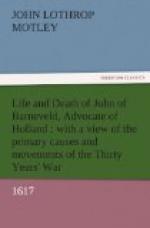And to do James justice, he had never fed Frederic with false hopes, never given a penny for his great enterprise, nor promised him a penny. He had contented himself with suggesting from time to time that he might borrow money of the States-General. His daughter Elizabeth must take care of herself, else what would become of her brother’s marriage to the daughter of Spain.
And now it was war to the knife, in which it was impossible that Holland, as well as all the other great powers should not soon be involved. It was disheartening to the cause of freedom and progress, not only that the great kingdom on which the world, had learned to rely in all movements upward and onward should be neutralized by the sycophancy of its monarch to the general oppressor, but that the great republic which so long had taken the lead in maintaining the liberties of Europe should now be torn by religious discord within itself, and be turning against the great statesman who had so wisely guided her councils and so accurately foretold the catastrophe which was now upon the world.
Meantime the Emperor Matthias, not less forlorn than through his intrigues and rebellions his brother Rudolph had been made, passed his days in almost as utter retirement as if he had formally abdicated. Ferdinand treated him as if in his dotage. His fair young wife too had died of hard eating in the beginning of the winter to his inexpressible grief, so that there was nothing left to solace him now but the Rudolphian Museum.
He had made but one public appearance since the coronation of Ferdinand in Prague. Attended by his brother Maximilian, by King Ferdinand, and by Cardinal Khlesl, he had towards the end of the year 1617 paid a visit to the Elector John George at Dresden. The Imperial party had been received with much enthusiasm by the great leader of Lutheranism. The Cardinal had seriously objected to accompanying the Emperor on this occasion. Since the Reformation no cardinal had been seen at the court of Saxony. He cared not personally for the pomps and glories of his rank, but still as prince of the Church he had settled right of precedence over electors. To waive it would be disrespectful to the Pope, to claim it would lead to squabbles. But Ferdinand had need of his skill to secure the vote of Saxony at the next Imperial election. The Cardinal was afraid of Ferdinand with good reason, and complied. By an agreeable fiction he was received at court not as cardinal but as minister, and accommodated with an humble place at table. Many looking on with astonishment thought he would have preferred to dine by himself in retirement. But this was not the bitterest of the mortifications that the pastor and guide of Matthias was to suffer at the hands of Ferdinand before his career should be closed. The visit at Dresden was successful, however. John George, being a claimant, as we have seen, for the Duchies of Cleve and Julich, had need of the Emperor. The King had need of John George’s vote. There was a series of splendid balls, hunting parties, carousings.




